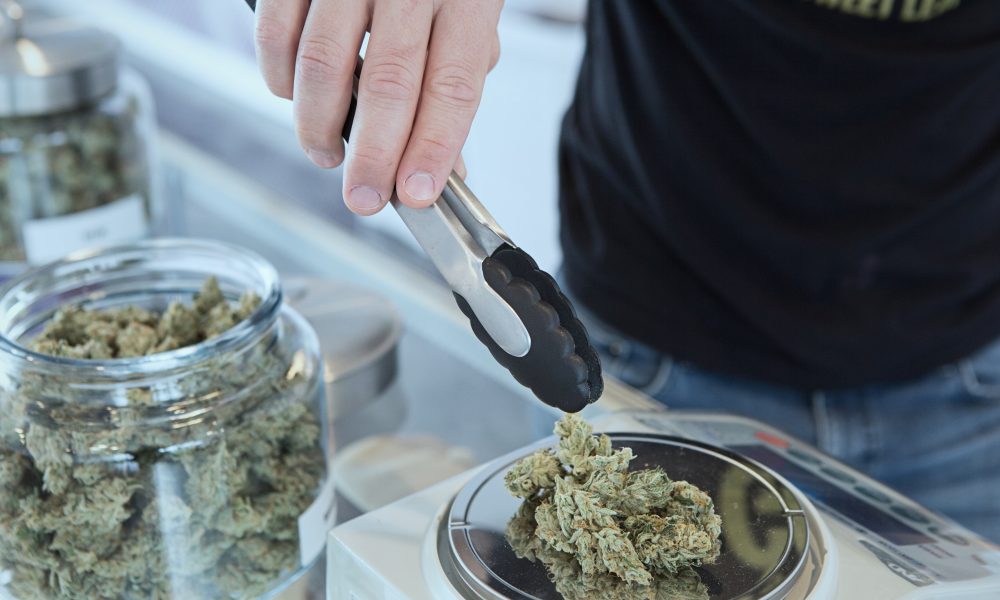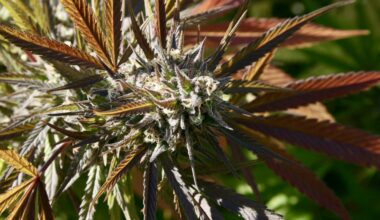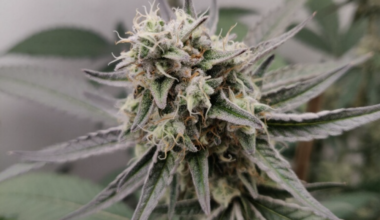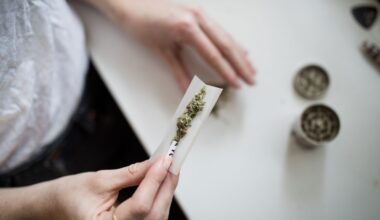New York marijuana regulators have put 52 unlicensed cannabis retailers on notice, publicizing dozens of cease and desist letters that they have sent to businesses accused of illegally selling marijuana as the state prepares to launch its adult-use market.
The Office of Cannabis Management (OCM) said that the storefronts are falsely claiming to be legal cannabis shops, without a license and without adhering to product testing requirements, which could jeopardize public health.
As stated in the letters, businesses that receive the warning and continue to sell marijuana without permission could be permanently barred from getting a license when regulators begin to issue them, which is expected to start happening later this year.
Regulators previously sounded the alarm about retailers that have attempted to exploit a “gifting” provision of the state’s cannabis law by selling non-marijuana products and then giving away “free” cannabis.
“There are no businesses currently licensed to sell adult-use cannabis in New York State,” Tremaine Wright, chair of New York’s Cannabis Control Board (CCB), said in a press release. “Selling any item or taking a donation, and then ‘gifting’ a customer a bag of untested cannabis does indeed count as a sale under New York’s Cannabis Law.”
“You need a license to sell cannabis in New York. Licensed sales and a regulated market are the only way New York’s customers will be assured that the cannabis products they are purchasing have been tested and tracked from seed to sale,” she said. “Sale of untested products put lives at risk. I implore these illegal store operators, and any other stores pretending to be legal operations, to stop selling cannabis products immediately.”
Regulators have been hard at work to get the state prepared to the start of adult-use retail sales. Last month, for example, CCB approved a series of proposed rules for packaging, labeling, advertising and testing requirements.
They also approved a series of adult-use cannabis cultivator applications to help ensure the market has enough product when recreational sales launch by the end of this year.
But the interim phase between the enactment of legislation legalizing possession and the implementation of rules for sales has created some confusion and also led to some actors seeking to profit in a currently unregulated market. As it stands, adults 21 and older can possess and publicly consume cannabis, as well as gift marijuana to other adults as long as they aren’t being compensated.
Legalizing cannabis makes cannabis safer.
Moving cannabis sales from the shadows into a legal, regulated market provides opportunities to stop sales to youth.
Read our letter to the NY Times from OCM Exec. Director Chris Alexander.https://t.co/o3mFXyj1SY pic.twitter.com/FqN8lhPx71
— NYS Office of Cannabis Management (@nys_cannabis) July 7, 2022
Wright also talked about the complicated legal landscape that’s developed in New York as the state moves from prohibition to legalization at a community board event in April.
She stressed that New York’s marijuana law was specifically crafted with those most impacted by criminalization in mind, and so regulators are working to ensure that people who engaged in previously illegal activities and were caught up in the war on cannabis have a seat at the table in the new industry.
But it’s a different story for those who have exploited this transitionary period by selling marijuana at unlicensed shops, she said at the time. While there may understandably be some confusion about the rules since certain cannabis activities are now legal, Wright said that regulators are cracking down on bad actors and encouraging communities to help them identify unauthorized sellers.
However, she stressed that they do not want police to play an enforcement role because they are “moving away from criminal action.”
That seems to square with what regulators told the targets of the new letters, simply saying they will be ineligible to be licensed to sell cannabis, rather than sending in the police to arrest them.
With respect to the 52 stores identified by OCM as having operated without a license, Executive Director Chris Alexander said on Thursday that these storefronts “aren’t creating opportunity, they are creating confusion.”
“New Yorkers think they’re buying a high-quality, tested product when they aren’t,” he said. “Not only are these stores operating in violation of New York’s Cannabis Law, but they also are breaking state tax and several municipal laws. I look forward to working with other regulatory bodies across the state to hold these stores accountable for their flagrant violations of the law.”
OCM Chief Equity Officer Damian Fagon said that “New York is building the most equitable cannabis industry in the nation, one that prioritizes those communities most harmed under cannabis prohibition.”
“Stores selling unregulated cannabis products without licenses undercut those efforts. Plain and simple,” Fagon said. “Illicit stores don’t contribute to our communities, they don’t support our public schools and they don’t protect consumers. That’s why we’re working with partners across government to investigate these operations and hold them accountable.”
Meanwhile, Gov. Kathy Hochul (D) signed a bill from Assembly Majority Leader Crystal Peoples-Stokes (D) and Sen. Michelle Hinchey (D) to create conditional cultivation licenses in February. The intent is to allow existing hemp operators to get a head start on growing marijuana to meet demand for the forthcoming industry.
—
Marijuana Moment is tracking more than 1,500 cannabis, psychedelics and drug policy bills in state legislatures and Congress this year. Patreon supporters pledging at least $25/month get access to our interactive maps, charts and hearing calendar so they don’t miss any developments.![]()
Learn more about our marijuana bill tracker and become a supporter on Patreon to get access.
—
Regulators also advanced a rule in March to make it so people with prior marijuana convictions, or whose family members have been harmed by criminalization, will get the first round of adult-use marijuana retailer licenses—ahead of existing medical cannabis businesses. A recent poll found that most New Yorkers voters are against that proposal.
During April’s CCB meeting, regulators also approved revised regulations to allow medical marijuana patients to grow their own plants for personal use following a public comment period on initial rules that were proposed last year.
In general, the rule would allow registered patients and caregivers to grow up to six plants, only three of which could be mature. They could possess up to five pounds of cannabis derived from those plants, which is consistent with the state’s adult-use legalization law.
Meanwhile, New York lawmakers recently sent a budget proposal to the governor’s desk that includes provisions to let marijuana businesses take state tax deductions that are available to other industries despite an ongoing federal ban on cannabis. That was signed into law.
Sen. Jeremy Cooney (D) filed a standalone bill in December seeking a similar carve-out for the state’s burgeoning cannabis market. Assemblymember Donna Lupardo (D) followed suit in her chamber. Cooney also filed a bill in May to allow regulators to disclose certain information about cannabis licensees to financial institutions to promote marijuana banking.
Hochul has repeatedly emphasized her interest in efficiently implementing the legalization law.
The governor released a State of the State book in January that called for the creation of a $200 million public-private fund to specifically help promote social equity in the state’s burgeoning marijuana market.
That proposal was also cited in the governor’s executive budget, which was released in January. The budget also estimated that New York stands to generate more than $1.25 billion in marijuana tax revenue over the next six years.
Hochul said that while cannabis business licenses have yet to be approved since legalization was signed into law last year, the market stands to generate billions of dollars, and it’s important to “create opportunities for all New Yorkers, particularly those from historically marginalized communities.”
OCM has also been putting out PSAs to promote public education about the marijuana policy change, including a first-of-its-kind taxpayer-funded marijuana ad that aired in most of New York during an NBA Finals game last month. The PSA boldly addressed the racially discriminatory harms of cannabis criminalization and highlighted steps that state regulators are taking to right the wrongs of prohibition.
CCB also wants the opportunity to showcase its marijuana PSA campaign on the social media app TikTok, but it was told by the company previously that it could not use the platform because of its existing ban on the use of the word “cannabis.” The department recently sent a letter to TikTok, requesting a policy change for government marijuana-related ads that concern public education.
Here are some other ways that New York lawmakers and regulators are working to promote drug policy reform as the state prepares to implement retail marijuana sales:
The New York Senate approved a bill last month that would require public health insurance programs to cover medical marijuana expenses and clarify that private insurers are allowed to do the same.
Both chambers of the state legislature have passed a measure to encourage businesses to use hemp materials for packaging, construction and other industrial purposes. After final procedural steps, the measure will be on its way to the governor.
The state Department of Labor separately announced in recent guidance that New York employers are no longer allowed to drug test most workers for marijuana.
Separately, the mayor of New York City says he’s looking into the idea of authorizing marijuana to be grown in greenhouses on the rooftops of public housing buildings—an ambitious proposal that’s unlikely to sit well with the federal government, which provides funding to support the NYC Housing Authority (NYCHA).
A New York senator filed a bill in May that would legalize what would essentially be licensed community marijuana gardens for people who aren’t able to cultivate cannabis at their own homes.
Also that month, a New York Assembly committee advanced a bill to establish a statewide safe consumption site program, allowing regulators to authorize facilities where people could use currently illicit drugs in a medically supervised environment.
Meanwhile, a New York lawmaker introduced a bill last year that would require the state to establish an institute to research the therapeutic potential of psychedelics.
Another state legislator filed legislation in December to legalize psilocybin mushrooms for medical purposes and establish facilities where the psychedelic could be grown and administered to patients.
Medical Disclaimer:
The information provided in these blog posts is intended for general informational and educational purposes only. It is not a substitute for professional medical advice, diagnosis, or treatment. Always seek the advice of your physician or other qualified healthcare provider with any questions you may have regarding a medical condition. The use of any information provided in these blog posts is solely at your own risk. The authors and the website do not recommend or endorse any specific products, treatments, or procedures mentioned. Reliance on any information in these blog posts is solely at your own discretion.







